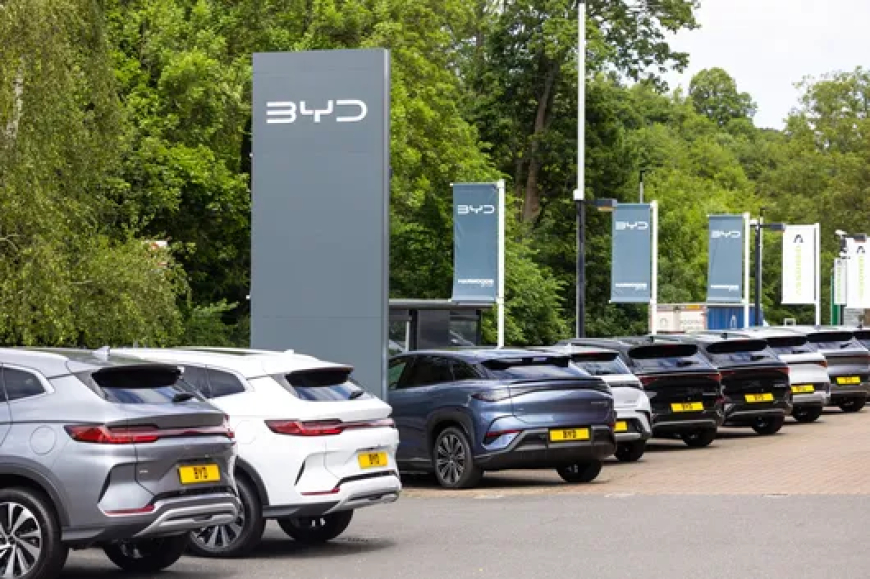Chinese Carmakers Near 10% UK Share After Fivefold BYD Surge
Chinese carmakers, led by BYD, are nearing a 10% market share in the UK auto sector, reshaping the EV landscape and challenging traditional manufacturers.

Chinese Carmakers Near 10% UK Share After Fivefold BYD Surge
London, June 5, 2025 — Chinese car manufacturers are rapidly accelerating their expansion into the UK market, nearing a 10% share of new car sales, driven largely by a stunning fivefold increase in registrations by electric vehicle (EV) maker BYD. This significant growth marks a pivotal moment in the global shift toward electric mobility and signals a changing dynamic in the European auto industry.
BYD Leads the Charge in EV Market
According to data from the Society of Motor Manufacturers and Traders (SMMT), BYD's UK vehicle registrations surged by more than 400% in the first five months of 2025 compared to the same period last year. This explosive growth has propelled BYD into the top tier of EV suppliers in Britain, contributing heavily to the rise in Chinese market share from just under 2% in early 2023 to nearly 10% by May 2025.
“The growth of BYD has been nothing short of meteoric,” said Alex Moore, automotive analyst at London-based firm AutoView Research. “They're not only offering competitive pricing but also high-spec vehicles that appeal to environmentally conscious consumers.”
Why UK Consumers Are Turning to Chinese EVs
The shift toward Chinese EVs is being driven by a mix of affordability, innovation, and timing. With UK consumers increasingly focused on sustainability and total cost of ownership, Chinese automakers such as BYD, MG (owned by SAIC), and Great Wall Motors are capitalizing on a market that is both receptive and price-sensitive.
"Chinese brands are offering high-quality EVs at prices significantly lower than their European and American counterparts," Moore added. "They're also quicker to market with newer technologies like solid-state batteries and advanced driver assistance systems."
The recent introduction of BYD's affordable Dolphin hatchback and Seal sedan has gained particular attention, offering longer range and faster charging at a fraction of the cost of established models like the Tesla Model 3 or VW ID.3.
Market Context: A Europe-Wide Disruption
The UK is not alone in witnessing a surge of Chinese automotive influence. Across Europe, Chinese EV brands are making headway in markets traditionally dominated by German, French, and Japanese manufacturers.
In Germany, BYD recently opened a flagship showroom in Berlin, while Nio and Xpeng continue to expand their sales networks across Scandinavia and Benelux. This European incursion is aided by the relatively slow rollout of affordable EV models from legacy carmakers and ongoing supply chain disruptions in the West.
“Chinese companies planned ahead,” said Julia Tanaka, European mobility expert at EV Intelligence. “They locked in battery supplies, streamlined shipping, and built in-market sales teams early. That preparation is now paying off.”
A Regulatory Tightrope
Despite this progress, challenges remain. The UK government has floated the possibility of imposing tariffs on imported EVs amid concerns over the trade imbalance and calls from local manufacturers to ensure a level playing field. However, these measures have not yet been implemented, and the current regulatory environment remains favorable for importers.
"The risk of protectionist policies is real, especially with the EU exploring anti-subsidy investigations," said James Keating, an international trade consultant. “But as long as Chinese automakers comply with emissions and safety standards, they’ll remain a strong force in the UK.”
Implications for UK Automakers
The rise of Chinese brands poses a serious threat to established UK-based manufacturers like Jaguar Land Rover and Mini, who are under pressure to electrify their lineups amid rising competition and tightening emissions targets.
"British automakers need to act fast if they want to remain relevant," Moore warned. “The Chinese are not just catching up—they're setting the pace.”
In response, companies like JLR and Stellantis (Vauxhall’s parent company) have announced accelerated EV roadmaps, factory overhauls, and battery plant investments to fend off the growing threat.
Investor Outlook: Opportunity Amid Disruption
From an investment perspective, the surge in Chinese car sales in the UK represents both risk and opportunity.
BYD, which is listed in Hong Kong and has Warren Buffett’s Berkshire Hathaway as a major shareholder, has seen its global stock price rise steadily on the back of strong international demand. Analysts believe its UK growth could boost long-term profitability.
“BYD’s ability to penetrate mature markets like the UK is proof of its staying power,” said Natasha Mills, a London-based equity analyst at GreenPort Capital. “Investors should keep a close eye on their expansion in Europe, which could be the next major profit driver.”
At the same time, UK automotive stocks may face headwinds as competition intensifies and margins are pressured. However, companies that adapt quickly to the EV transition could still benefit from a broader electrification trend.
A New Era for the UK Auto Market
The near-10% market share achieved by Chinese carmakers in the UK is not just a milestone—it’s a signal of broader transformation in the automotive world. With BYD leading the way, the influx of Chinese EVs is reshaping consumer expectations and industry norms.
While questions remain around regulation, infrastructure, and domestic industry resilience, one thing is clear: Chinese automakers are here to stay, and their influence on the UK market is only growing.
What's Your Reaction?
 Like
0
Like
0
 Dislike
0
Dislike
0
 Love
0
Love
0
 Funny
0
Funny
0
 Angry
0
Angry
0
 Sad
0
Sad
0
 Wow
0
Wow
0












































































